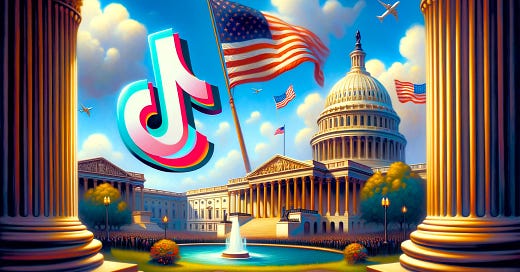TikTok Ban Case Kicks Off in DC
ByteDance's Lawsuit Challenges the "Sell Out, or Ship Out" Federal Law.
Impugning the “Sell-or-Shut” Federal Law
The Biden administration’s new law forcing the sale or ban of TikTok is the unconstitutional result of “political demagoguery” and should be overturned, TikTok attorneys argued in a court brief on Thursday (20th June). This statement to the U.S. Court of Appeals in Washington D.C. marks the start of one of the most consequential legal battles in American internet history. The conflict revolves around the U.S. government's decision to force the sale or ban TikTok, citing national security concerns.
This article revisits the background of the ban, and examines the legal challenges arrayed by TikTok, and the implications for different sectors. The lawsuit filed by TikTok’s China-based owner, ByteDance, describes the legislation as an "extraordinary and unconstitutional assertion of power" that violates the First Amendment rights of over 170 million American TikTok users.
Background and Timeline
Concerns have been growing for years in the U.S. that TikTok's Chinese ownership means the Chinese government could access U.S. user data or influence what content Americans see. Key events include:
July 2020: India bans TikTok amid border clash with China.
August 2020: President Trump issues executive orders demanding ByteDance divest from TikTok's U.S. operations within 90 days.
2021: President Biden postpones legal cases involving Trump's TikTok ban.
June 2022: Reports emerge that China-based ByteDance employees accessed U.S. TikTok user data.
February 2023: White House gives federal agencies 30 days to delete TikTok from government devices.
March 2023: FBI and DOJ launch investigation into allegations TikTok spied on U.S. journalists.
March 2024: U.S. House passes bill requiring ByteDance to sell TikTok or face a ban.
April 2024: Congress passes foreign aid package including the TikTok bill, which President Biden signs into law, giving ByteDance up to a year to sell.
The U.S. argues TikTok threatens national security because Chinese laws compel companies to assist in intelligence gathering, if asked. However, TikTok maintains it has never shared U.S. data with China and that Project Texas, a $1.5 billion plan to store U.S. data domestically with Oracle, would address concerns.
Latest Developments
In June 2024, TikTok filed a lawsuit with the U.S. Court of Appeals in Washington D.C., arguing that the recently passed law banning TikTok unless it is sold is unconstitutional because it stifles free speech. TikTok asserts that the law is based on "speculative and analytically flawed concerns" and that Congress ignored less extreme options that would also protect national security. The court has set a fast-tracked schedule, with oral arguments to begin on September 16, just four months before the January 19, 2025 deadline for TikTok to divest from its Chinese parent company ByteDance. Both TikTok and the Justice Department have asked for a ruling by December 6.
TikTok's Legal Challenge
Constitutional Argument
TikTok's legal brief challenges the Biden administration's sale-or-ban law, accusing government officials of adopting a stance "unmoored from reality." The company argues that a law demanding TikTok's China-based owner, ByteDance, sell its U.S. operations by January 19, 2025 or face a nationwide ban would violate Americans' First Amendment right to free expression.
Internal Documents and Negotiations
For the first time, TikTok has shared internal documents from years of failed negotiations with the federal government. These documents include a roughly 100-page draft national security agreement offered to the Government in August 2022, which would have given federal officials extraordinary power to shape and oversee TikTok's U.S. operation, including a nationwide kill switch. The Biden administration declined the offer, arguing that it was insufficient to neutralize their concerns without detailing why.
Impact on Free Speech and Online Communities
A group of TikTok creators also filed a legal challenge last month, funded by TikTok. These creators argue that the law would be a "devastating blow" to their online communities and livelihoods. The law, they contend, would turn the U.S. app into an "island" where American users would be walled off from videos created outside their national borders, resulting in an experience detached from the rest of the global internet.
Broader Implications
National Security Concerns
The administration has said the law is critical to protect national security, citing fears that the Chinese government could boost propaganda through the popular app's video recommendations or spy on Americans' personal lives — concerns that have not been substantiated with evidence. The Justice Department is expected to respond to TikTok's brief next month.
Industry-Wide Issues
Experts retained by TikTok argue that the concerns about propaganda, disinformation, and data security are industry-wide issues not unique to TikTok. The data TikTok collects is "not meaningfully different" from what is gathered by Google, Facebook, and Snapchat. Many U.S. tech companies have China-based subsidiaries, which therefore face the same theoretical risk.
Summing Up and Looking Forward
The high-profile legal battle between TikTok and the U.S. Government could have dramatic implications for the future of online speech and U.S.-China tech relations. A ruling is expected by the end of 2024. The outcome of this case will be eagerly awaited by creators, free-speech activists, legal experts, geo-political and trade analysts, China-watchers, and the tech industry in general, as it could set a significant precedent for the regulation of foreign-owned tech companies in the United States.
If you believe this article would interest someone you know, please feel free to share it anonymously (for us), using any platform that you prefer.





